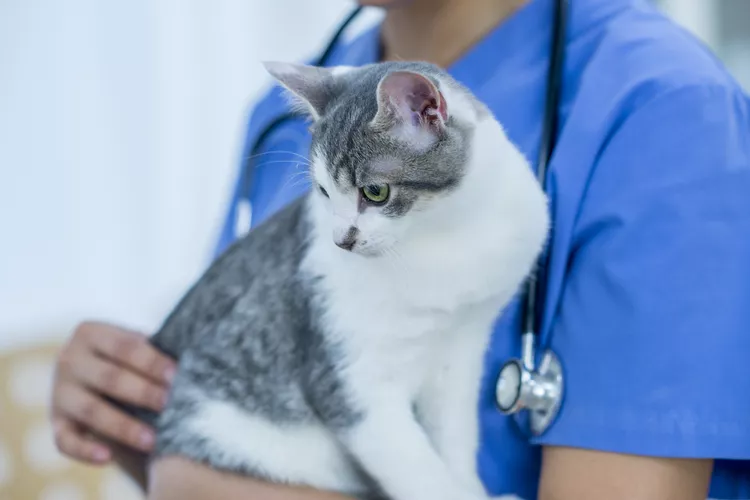Pyometra in Cats

Pyometra is a serious uterine infection that affects unspayed female cats. It occurs within weeks of a cat being in estrus (or in heat) as a result of abnormal hormone changes. Bloody, purulent vaginal discharge and abdominal swelling are the most indicative symptoms of pyometra. Prompt veterinary treatment is critical because pyometra can be fatal if untreated.
What Is Pyometra?
Pyometra is a bacterial infection that occurs when a female cat's progesterone (a reproductive hormone) prevents the uterine lining from shedding after estrus. The abnormally thickened lining creates an environment conducive to bacterial invasion, most often by certain strains of E. coli.
Symptoms of Pyometra in Cats
Pyometra symptoms will vary, and some of the symptoms could indicate many other types of illnesses. Symptoms will worsen as your cat's illness progresses and you should immediately call your veterinarian for an appointment.
There are two types of pyometra infections commonly seen in cats: open and closed. Open pyometra refers to cases in which the cervix is open, allowing some blood and purulent fluid (pus) to drain out. This discharge may be visible, but an infected cat will lick her vaginal opening more than usual to clean the leaking fluid. Blood may appear on bedding or furniture.
If the infection is closed, the cervix is shut tightly so that the pus can't drain. In these cases, retained fluid will cause the uterus to distend and eventually rupture, leading to sepsis (infection of the blood). The cat may experience vomiting and diarrhea, which will also lead to dehydration and make the cat feel very ill, becoming listless and unwilling to eat.
Your cat may begin to change its litterbox habits as a result of the malaise and start to urinate outside of the box. The bacterial toxins circulating in the cat's body may also affect the kidneys' function. The kidneys will be unable to hold fluid and this will increase a cat's urine production. This symptom can occur in both open and closed pyometra infections.
What Causes Pyometra in Cats?
The cause of pyometra is not fully understood, but it seems to depend on several factors happening concurrently.
- A cat in heat will have a thickened uterine lining in preparation for a potential pregnancy. Abnormally elevated progesterone in the cat's system prevents the uterus from expelling the excess blood and tissue lining the uterus.
- After several cycles of a thickened lining but no pregnancies, cysts will form in the lining of the uterus and bacteria can accumulate in the un-shed uterine lining.
- The cysts in the uterus secrete fluids that encourage bacteria growth, causing infection and the development of pus.
Not every cat with a uterus will get a pyometra infection. However, older cats with thickened uterine linings and cats with abnormal or cystic uterine linings are at greater risk for contracting pyometra.
How Do Vets Diagnose Pyometra in Cats?
Your veterinarian will perform a full physical examination along with obtaining a medical history of your cat. If there is no evidence that your cat has been spayed and is showing signs of pyometra, the vet will run tests to identify the infection.
Blood tests may reveal signs of infection like an elevated white blood cell count and a high level of certain proteins in the blood. Vaginal cytology will show if there are bacteria and white blood cells present in the uterine fluid. In addition, X-rays or ultrasounds may be used to see the size of the uterus.
How to Treat Pyometra
If a pyometra is diagnosed in your cat, surgery will be necessary to remove the infected uterus. The surgery is more complex than routine spaying because care needs to be taken to ensure that the enlarged uterus does not leak or rupture upon removal. Most cats with pyometra will also have signs of sepsis, requiring additional stabilization before surgery and longer hospital stays after surgery.
Antibiotics and pain medications will be prescribed as well to help your cat recover from the infection and surgery.
Though often not the preferred treatment, a medical option without surgery is a possibility. Your veterinarian can offer prostaglandins, a group of hormones that will allow the progesterone to recede and open the cervix to expel the infection. The results are spotty and it is not advisable for a severely ill cat.
Prognosis for Cats with Pyometra
A surgical outcome can be favorable if there is no contamination of the abdomen during surgery. Some cats will sustain permanent kidney damage due to the infection, even after surgery, which will require lifelong management.
How to Prevent Pyometra
The only way to prevent pyometra from occurring in your cat is to have it spayed. This surgery will remove either both the uterus and the ovaries or just the ovaries so that a cat cannot go through a heat cycle. Without the hormones that are released from the ovaries during a heat cycle or a uterus that can get infected, a cat cannot develop a pyometra infection. Spaying a cat is a commonly recommended procedure for this and other health reasons.